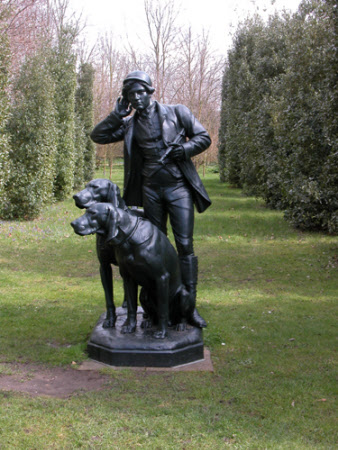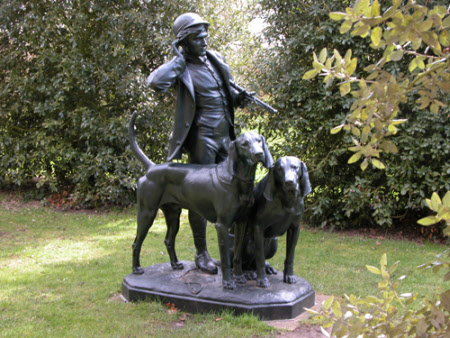Huntsman and dogs (Valet de Limiers)
Henri Alfred Marie Jacquemart (1824 - 1896)
Category
Art / Sculpture
Date
1866 (model) - 1870 - 1890 (cast)
Materials
Cast iron
Measurements
1740 x 840 mm; 1300 mm (Length)
Place of origin
France
Order this imageCollection
Anglesey Abbey, Cambridgeshire
NT 515136
Summary
Cast iron, Huntsman and dogs (Valet de Limiers), Henri-Alfred-Marie Jacquemart (1824-1896), model 1866, cast c. 1870-90. A cast iron group of a young huntsman with two blood hounds (Chien Normand or Chien Français Tricolore), one seated and one standing, listening in the same direction as their master. On an octagonal cast iron base, stamped 'VAL D'OSNE' (foundry mark) on front at proper left.
Full description
The French art foundry Val d'Osne cast many works by the animalier (Henri) Alfred Jacquemart, including this and other examples of the Valet de Limiers or Huntsman and dogs. Val d'Osne exhibited casts of the group at the Sydney and Melbourne International Exhibitions of 1879 and 1880 respectively. These are now mounted at the Sydney Royal Botanic Gardens and Mount Macedon, Melbourne. An undated cast installed in 1925 on Santa Monica Boulevard, Beverley Hills, was purchased by the American banker Willis Douglas Longyear from Château-Thierry, Hauts-de-France, where his son had been killed in 1918. The cast itself had been badly damaged and stood above a subterranean chamber where American signal corps were stationed during the bombardment of Château-Thierry. An Austrian cast, known as 'Der Lauscher' (The Eavesdropper), with an historic title of 'Jagdgruppe halali' (Hunting group halali), the German word for the horn signal blown to mark the end of the hunt, is at the Kaiservilla, Bad Ischl. It was owned by the Empress Elizabeth of Austria (1837-98) and her husband the Emperor Franz-Josef I (1830-1916), and had apparently been a present from Queen Victoria. A cast made in 1887 was at Duilust in the Netherlands and was later sold and installed the gardens of Elswout, a country house in Overveen. A further cast in Nice, France, titled 'Valet de chiens', is mounted in the gardens of the Château de Valrose, a neogothic mansion built by the financier and railroad magnate Paul Grigoriévitch, baron von Derwies, who lived there from 1870 until his death in 1881. Alice Rylance-Watson August 2019
Provenance
Bequeathed to the National Trust by Huttleston Rogers Broughton, 1st Lord Fairhaven (1896-1966) with the house and the rest of the contents.
Credit line
Anglesey Abbey, The Fairhaven Collection (The National Trust)
Makers and roles
Henri Alfred Marie Jacquemart (1824 - 1896), sculptor Val D'Osne Foundry, founder
References
Roper 1964: Lanning Roper, The Gardens of Anglesey Abbey, Cambridgeshire. The Home of Lord Fairhaven, London 1964, p. 80, pl. 66a. Christie, Manson & Woods 1971: The National Trust, Anglesey Abbey, Cambridge. Inventory: Furniture, Textiles, Porcelain, Bronzes, Sculpture and Garden Ornaments’, 1971, p. 163. Mackay 1973: James Mackay, The animaliers; the animal sculptors of the 19th and 20th centuries, London 1973 Payne 1986: Christopher Payne, Animals in Bronze: reference and price guide, Antique Collectors' Club, Clopton 1986

